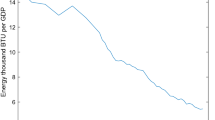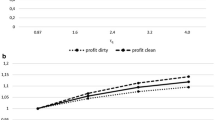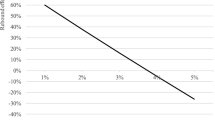Abstract
We study the effects of environmental tax policy in a dynamic overlapping generations model of a small open economy with environmental quality incorporated as a durable consumption good. Raising the energy tax may yield an efficiency gain if agents care enough about the environment. The benefits are unevenly distributed across generations since capital ownership, and the capital loss induced by a tax increase, rises with age. A suitable egalitarian bond policy can be employed in order to ensure everybody gains to the same extent. With this additional instrument the optimal energy tax can be computed.
Similar content being viewed by others
REFERENCES
Apostolakis, B.E. (1990), 'Energy-Capital Substitutability/Complementarity: The Dichotomy,' Energy Economics, 12, pp. 48-58.
Barro, R.J. and Sala-i-Martin, X. (1995), Economic Growth, McGraw-Hill, New York.
Blanchard, O.-J. (1985), 'Debt and Finite Horizons,' Journal of Political Economy, 93(2), pp. 223-247.
Bovenberg, A.L. (1993), 'Investment-promoting Policies in Open Economies: The Importance of Intergenerational and International Effects,' Journal of Public Economics, 51, pp. 3-54.
Bovenberg, A.L. and B.J. Heijdra (1998), 'Environmental Tax Policy and Intergenerational Distribution,' Journal of Public Economics, 67, pp. 1-24.
Card, D. (1994), 'Intertemporal Labour Supply: An Assessment,' In: C. Sims, (ed.), Advances in Econometrics: Sixth World Congress, II, Cambridge University Press, Cambridge.
Diamond, P.A. (1965), 'National Debt in a Neoclassical Growth Model,' American Economic Review, 55, pp. 1126-1150.
Dixit, A.K. (1985), 'Tax Policy in Open Economies,' In: A. Auerbach and M. Feldstein, (eds.), Handbook of Public Economics, North-Holland, Amsterdam.
Greenwood, J., Z. Hercowitz, and G. Huffman (1988), 'Investment, Capacity, Utilisation, and the Real Business Cycle,' American Economic Review, 78, pp. 402-417.
Hayashi, F. (1982), 'Tobin's Marginal q and Average q: A Neoclassical Interpretation,' Econometrica, 50(1), pp. 213-224.
Heijdra, B.J. and A. van der Horst (1999), 'Taxing Energy to Improve the Environment: Mathematical Appendix and Further Results,' Mimeo, University of Groningen. Download from: http://www.eco.rug.nl/medewerk/heijdra/download.htm.
John, A. and R. Pecchenino (1994), 'An Overlapping Generations Model of Growth and the Environment,' Economic Journal, 104, pp. 1393-1410.
John, A., R. Pecchenino, D. Schimmelpfennig, and S. Schreft (1995), 'Short-lived Agents and the Long-lived Environment,' Journal of Public Economics, 58, pp. 127-141.
Judd, K.L. (1982), 'An Alternative to Steady-state Comparisons in Perfect Foresight Models,' Economics Letters, 10, pp. 55-59.
Smulders, S. (1995), 'Environmental Policy and Sustainable Growth: An Endogenous Growth Perspective,' De Economist, 143, pp. 163-195.
Solow, R.M. (1974), 'Intergenerational Equity and Exhaustible Resources,' Review of Economic Studies, Symposium, 41, pp. 29-45.
Uzawa, H. (1969), 'Time Preference and the Penrose Effect in a Two-class Model of Economic Growth,' Journal of Political Economy, 77, pp. 628-652.
Yaari, M. (1965), 'Uncertain Lifetime, Life Insurance, and the Theory of the Consumer,' Review of Economic Studies, 32, pp. 137-150.
Rights and permissions
About this article
Cite this article
Heijdra, B.J., van der Horst, A. Taxing Energy to Improve the Environment: Efficiency and Distributional Effects. De Economist 148, 45–69 (2000). https://doi.org/10.1023/A:1003912412062
Issue Date:
DOI: https://doi.org/10.1023/A:1003912412062




